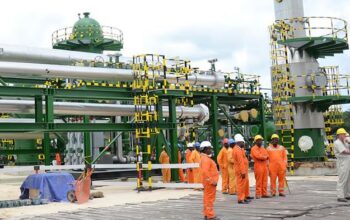In a significant move, Angola declared its withdrawal from the Organization of Petroleum Exporting Countries (OPEC) due to restrictions on oil production.
The Minister of Mineral Resources, Oil, and Gas, Diamantino Pedro Azevedo, made this announcement, citing the decision as one made in defense of Angola’s interests.
Azevedo conveyed this pivotal decision following the tenth ordinary meeting of the Council of Ministers, presided over by President João Lourenço.
Emphasizing the government’s stance, Azevedo expressed that Angola perceives no tangible benefits from its OPEC membership.
“This was a weighty decision reached by the Council of Ministers. Remaining in an organization that doesn’t align with Angola’s interests seems counterproductive,” Azevedo stated during a press briefing at Luanda’s Presidential Palace.
Highlighting the gravity of this move, he underscored Angola’s six years of active involvement in OPEC, asserting that the country’s role within the organization did not yield significant outcomes. “Our involvement and contributions didn’t result in outcomes favorable to our interests,” Azevedo emphasized.
Angola’s participation in OPEC had been assertive, contributing proposals to broaden the organization’s dimensions.
However, the minister reiterated that the nation’s priorities and strategies for its hydrocarbons sector now demand exclusive focus, necessitating the decision to part ways with OPEC.
At the crux of this withdrawal lies the discord between Angola and OPEC over production quotas. Angola rebuffed the quota allocated by OPEC in December, opting to sustain its 2024 target of 1.18 million barrels per day.
The discrepancy arose when OPEC+ proposed a target of 1.11 million barrels/day, whereas Angola sought to produce an additional 70 thousand barrels.
While Angola reaffirmed its stance during the 26th ministerial meeting, OPEC’s decision on quotas failed to align with Angola’s projections and capabilities.
As the organization pursued a different trajectory, Angola found itself at odds with the set quota, leading to this fundamental decision to exit OPEC.
Angola’s departure from OPEC signifies a strategic shift in the nation’s approach to its hydrocarbons sector, allowing the country to steer its oil production strategies independently in alignment with its objectives and interests.
READ ALSO: Oil Prices Rebound Despite Exit from OPEC, Exit from OPEC brings autonomy to Angolan oil policy
![]()




